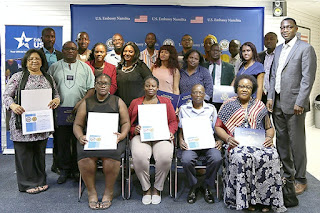The fraudulent document training participants receive award certificates for taking part in the training, March 29, 2017. (U.S. Department of State photo)
Diplomatic Security : Diplomatic Security Service Conducts Fraudulent Documentation Recognition Course for Namibian Officials
06/22/2017 12:58 PM EDT
June 16, 2017
By Anne Carey, DSS Public Affairs
Document fraud, and its nexus to international terrorism, poses more risk to national security than ever before.
This reality has thrust a routine, but crucial, training program into the spotlight: U.S. Embassy-sponsored training in detecting document fraud before it becomes visa and passport fraud.
For Diplomatic Security Service (DSS) special agents at the U.S. Embassy Windhoek, Namibia, and the U.S. Consulate Cape Town, South Africa, who recently trained about 80 Namibian law enforcement and financial officials at the American Cultural Center in Windhoek, it was also a “win-win” for both missions, according to Windhoek Regional Security Officer Jason Meixner.
Law enforcement officers and other officials who took the fraudulent document training course in March learned about detecting imposters, fraud trends in regional travel documents, and counterfeit-resistant security features used on U.S. travel documents. They are able to immediately begin incorporating what they learned during the training into their daily duties in border security, law enforcement, immigration, and the financial sector.
U.S. Assistant Regional Security Officer-Investigations Cassius Gray and Criminal Fraud Investigator Antonio Solomon ran the workshops. Both men are posted at the U.S. Consulate in Cape Town and assist U.S. Embassy Windhoek with criminal investigations when needed.
“We had numerous compliments from everyone that attended [the three-day workshop] that both Cassius and Antonio were great instructors, and kept all of the students engaged,” RSO Meixner wrote in an email.
“We would love for them to return sometime at the end of this year or early next year to put on the same workshop in Walvis Bay, Namibia for law enforcement officials working in the airports and seaports on the coast,” RSO Meixner added.
According to RSO Meixner, the training not only enhanced the U.S. embassy’s contacts with Namibian law enforcement officials, but will likely benefit the U.S. Consulate in Cape Town with new Namibian Customs and Immigration contacts working the South African/Namibian border.
The training is an example of how DSS’ Overseas Criminal Investigations (OCI) division assists DSS personnel assigned to missions overseas in developing law enforcement relationships and enhance its foreign partners’ capabilities and security procedures.
As OCI Division Chief Jeff McGallicher said in November 2016, on a local level, OCI’s closest partners are police, immigration, customs, and airline personnel in the host country. Together they work to “protect the integrity of the passport and visa systems, disrupt criminal and terrorist mobility, and coordinate with host nation law enforcement to combat the production and use of fraudulently obtained travel and identity documents.”
On April 6, the Namibian Sun picked up the story. Namibia’s senior immigration officer, Philemon Shikale, told the Sun that fraud cases in the country have increased in the past two years. Imposters are now producing fake visa documents and removing authentic pictures from identity documents — replacing them with fakes.
“Namibia has strict immigration laws and this is forcing many travelers to forge their documents,” according to Shikale, who works at a border control site in Windhoek.

No comments:
Post a Comment